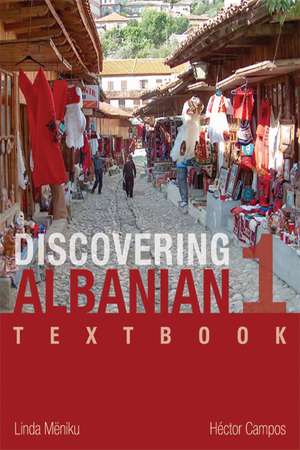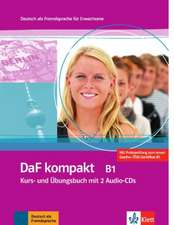Discovering Albanian I Textbook
Autor Linda Mëniku, Héctor Camposen Limba Engleză Paperback – aug 2011
Approximately five million people worldwide speak Albanian. The opening of Albania in the 1990s to broader trading and diplomatic relations with other nations has created a need for better knowledge of the language and culture of this country. This book teaches the student to communicate in everyday situations in the language, with each chapter introducing a new situational context. Students learn to discuss work, vacations, health, and entertainment. Students also learn to practice basic skills such as shopping, ordering tickets, and renting an apartment. Upon completing this textbook, students will be at the A2/B1 level of proficiency on the scale provided by the Common European Framework of Reference for Languages (CEFR).
The textbook includes:
• eighteen lessons based on real-life situations, including three review lessons
• dialogues to help introduce vocabulary and grammatical structures
• comprehension questions and exercises
• related readings at the end of each chapter
• full translations for all examples discussed in grammar sections
• a series of appendixes with numerous charts summarizing main classes of nouns, adjectives, and verbs
• an appendix with the solutions to most of the exercises in the book
• a glossary with all the words in the dialogs and readings.
The textbook includes:
• eighteen lessons based on real-life situations, including three review lessons
• dialogues to help introduce vocabulary and grammatical structures
• comprehension questions and exercises
• related readings at the end of each chapter
• full translations for all examples discussed in grammar sections
• a series of appendixes with numerous charts summarizing main classes of nouns, adjectives, and verbs
• an appendix with the solutions to most of the exercises in the book
• a glossary with all the words in the dialogs and readings.
Preț: 271.43 lei
Nou
Puncte Express: 407
Preț estimativ în valută:
51.94€ • 54.36$ • 43.23£
51.94€ • 54.36$ • 43.23£
Carte tipărită la comandă
Livrare economică 31 martie-14 aprilie
Preluare comenzi: 021 569.72.76
Specificații
ISBN-13: 9780299250843
ISBN-10: 0299250849
Pagini: 416
Dimensiuni: 216 x 279 x 20 mm
Greutate: 0.84 kg
Ediția:1
Editura: University of Wisconsin Press
Colecția University of Wisconsin Press
ISBN-10: 0299250849
Pagini: 416
Dimensiuni: 216 x 279 x 20 mm
Greutate: 0.84 kg
Ediția:1
Editura: University of Wisconsin Press
Colecția University of Wisconsin Press
Recenzii
“Discovering Albanian 1 lightens the burden of the instructor, allowing for more productive efforts in designing an effective and modern syllabus.”—Alexander Murzaku, author of Inverse Dictionary of Albanian
Notă biografică
Linda Mëniku is a lecturer of linguistics at the University of Tirana and a PhD candidate in linguistics at the University of Tirana in Albania and the European University–Viadrina in Germany. Héctor Campos is associate professor of linguistics and modern Greek at Georgetown University in Washington, D.C.
Cuprins
Preface
Introduction
0.1 The Albanian Alphabet
0.2 The Pronunciation of Albanian Letters
0.3 The Alphabet and Some Common Albanian Names
Mësimi 1: Prezantimi dhe përshëndetjet. 'Introductions and Greetings.'
1 Subject pronouns in Albanian
2 The verb JAM in the Present Tense Indicative
3 The numbers from 0 to 12
4 Telling time (Part I)
5 Negative and interrogative sentences
Mësimi 2: Nga jeni? Ç' gjuhë flisni? 'Where are you from? What language do you speak?'
6 The verb FLAS in the Present Tense Indicative
7 Countries, nationalities and languages
8 NGA to express origin and the definite nominative form of countries
9 Addressing someone by name
10 Numbers from 13 to 99
11 Telling time (Part II)
Mësimi 3: Ku banoni? 'Where do you live?'
12 The verb PUNOJ and Class 1
13 The particle PO
14 The preposition NË 'in, at'
15 Sa vjeç/sa vjeçe 'how old?'
16 The verb KAM 'to have' in the Present Tense Indicative
17 The verb VIJ 'to come' in the Present Tense Indicative
18 The preposition TE(K) 'to, at (a place)'
19 The numbers from 100 to 1 and the basic mathematical operations
Mësimi 4: Çfarë profesioni keni? 'What profession do you have?'
20 Masculine, feminine, singular, plural professions and nationalities
21 The demonstrative forms
22 The days of the week
23 The irregular verbs JAP 'to give', DUA 'to want' and THEM 'to say'
24 Inviting someone: A+ Present Tense Indicative
25 Në ç' orë?/ Në çfarë ore? 'What time?'
26 The numbers from 1 to 10
Mësimi 5: Në shtëpi. 'At home.'
27 Singular definite nominative nouns: feminine nouns
28 Singular definite nominative nouns: masculine nouns
29 KA . . . 'there is, there are . . . '
30 MBI 'on' and NËN 'under'
31 Class 2 adjectives: the linking article with singular definite nouns
32 Class 2 adjectives: adjective agreement (singular forms)
33 Class 2 adjectives modifying indefinite nouns
34 The weather
35 The seasons and the months of the year
Mësimi 6: Përsëritje. 'Review'
Mësimi 7: Çfarë ka sonte në televizor? 'What's on TV tonight?'
36 The verbs NJOH 'to know' and SHOH 'to see' in the Present Tense Indicative
37 The nominative/accusative indefinite plural: masculine nouns
38 The nominative/accusative definite plural: masculine nouns
39 Nationality and class 1 adjectives
40 The nominative/accusative indefinite plural: feminine nouns
41 The nominative/accusative definite plural: feminine nouns
42 Class 2 adjectives: the linking article with plural definite nouns
43 Class 2 adjectives: adjective agreement (plural forms)
44 Class 2 adjectives with nominative/accusative indefinite plurals
45 Some irregular class 2 adjectives in the plural
Mësimi 8: Në dyqan. 'At the store.'
46 Class 2 verbs
47 Superlative constructions
48 Comparative constructions
49 Present subjunctive
50 The modal verbs DUHET 'must,' MUND 'can' and the present subjunctive
51 Other basic constructions that require present subjunctive
52 Future tense
Mësimi 9: Shtëpi dhe hotel. 'House and hotel.'
53 Singular nouns in accusative case
54 Plural nouns in accusative case
55 Prepositions and accusative case
56 The demonstrative forms in accusative case
57 The interrogative pronouns KUSH 'who' and CILI 'which'
58 Class 2 adjectives: the linking article with accusative definite nouns
59 Class 2 adjectives: the linking article with accusative indefinite nouns
60 Ordinal numbers
61 Class 3 and class 4 verbs
Mësimi 10: Festat zyrtare në Shqipëri. 'Official holidays in Albania.'
62 Definite genitive: singular forms
63 Definite genitive: plural forms
64 Basic uses of the genitive case
65 Asking questions with "whose . . ."
66 Modifying a definite genitive form
67 Indefinite genitives
68 The genitive forms of CILI 'which'
69 The genitive forms of the demonstratives KY 'this' and AI 'that'
Mësimi 11: Rrobat. 'Clothes.'
70 Class 6 verbs: the Present Tense Indicative of verbs in–hem
71 Passive constructions
72 Negative, progressive, subjunctive and future of Class 6 verbs
73 Dative pronouns: strong and weak forms
74 Basic uses of the dative case
75 Dative case on nouns
76 Position of the dative clitics
77 Dative demonstratives
78 Dative forms of KUSH 'who' and CILI 'which'
Mësimi 12: Përsëritje. 'Review.'
Mësimi 13: Pushime dhe libra. 'Vacation and books.'
79 Simple Past Tense: class 1 verbs
80 Simple Past Tense: class 3 verbs
81 Simple Past Tense: class 2 verbs
82 Simple Past Tense: irregular verbs
83 Accusative pronouns: strong and weak forms
84 Basic uses of the accusative clitic pronouns
85 Të + accusative clitic pronouns
Mësimi 14: Kinema, imajl dhe internet. 'Cinema, e-mail and Internet.'
86 Simple Past Tense: class 6 verbs
87 Possessive adjectives: nominative forms
88 Possessive adjectives: accusative forms
Mësimi 15: Çfarë dëshironi? 'How can I help you?'
89 Attributive ablative: indefinite singular form
90 Attributive ablative: indefinite plural form
91 Basic uses of the indefinite ablative
92 Çfarë vs. C'
93 Imperative
94 Negative imperative and clitic pronouns
95 Ablative: definite forms
96 Basic uses of the ablative case
97 The ablative forms of KUSH 'who' and CILI 'which'
98 The ablative forms of KY 'this' and AI 'that'
99 The ablative forms of the personal pronouns
Mësimi 16: Pushime dhe histori 'Vacations and history'
100 Imperfect Indicative: active forms
101 Imperfect Indicative: class 6 verbs
102 Imperfect Subjunctive
103 Possessive adjectives: genitive, dative and ablative forms
Mësimi 17: Shëndeti 'Health.'
104 Present Perfect: class 1 through class 5 verbs
105 Present Perfect: class 6 verbs
106 Uses of the Present Perfect
107 Future Perfect and Present Perfect Subjunctive
108 Pluperfect Indicative
Mësimi 18: Përsëritje. 'Review.'
Appendix 1: Personal pronouns and clitics
Appendix 2: Demonstrative pronouns and adjectives
Appendix 3: Possessive adjectiveds
Appendix 4: The interrogative and relative pronouns CILI 'which' and KUSH 'who'
Appendix 5: Masculine nouns
Appendix 6: Feminine nouns
Appendix 7: Linking articles with class 2 adjectives
Appendix 8: Present and imperfect forms
Appendix 9: Most common regular and irregular verbs
Appendix 10: Past tense of regular and irregular verbs
Appendix 11: Answers to selected exercises
General Glossary
Introduction
0.1 The Albanian Alphabet
0.2 The Pronunciation of Albanian Letters
0.3 The Alphabet and Some Common Albanian Names
Mësimi 1: Prezantimi dhe përshëndetjet. 'Introductions and Greetings.'
1 Subject pronouns in Albanian
2 The verb JAM in the Present Tense Indicative
3 The numbers from 0 to 12
4 Telling time (Part I)
5 Negative and interrogative sentences
Mësimi 2: Nga jeni? Ç' gjuhë flisni? 'Where are you from? What language do you speak?'
6 The verb FLAS in the Present Tense Indicative
7 Countries, nationalities and languages
8 NGA to express origin and the definite nominative form of countries
9 Addressing someone by name
10 Numbers from 13 to 99
11 Telling time (Part II)
Mësimi 3: Ku banoni? 'Where do you live?'
12 The verb PUNOJ and Class 1
13 The particle PO
14 The preposition NË 'in, at'
15 Sa vjeç/sa vjeçe 'how old?'
16 The verb KAM 'to have' in the Present Tense Indicative
17 The verb VIJ 'to come' in the Present Tense Indicative
18 The preposition TE(K) 'to, at (a place)'
19 The numbers from 100 to 1 and the basic mathematical operations
Mësimi 4: Çfarë profesioni keni? 'What profession do you have?'
20 Masculine, feminine, singular, plural professions and nationalities
21 The demonstrative forms
22 The days of the week
23 The irregular verbs JAP 'to give', DUA 'to want' and THEM 'to say'
24 Inviting someone: A+ Present Tense Indicative
25 Në ç' orë?/ Në çfarë ore? 'What time?'
26 The numbers from 1 to 10
Mësimi 5: Në shtëpi. 'At home.'
27 Singular definite nominative nouns: feminine nouns
28 Singular definite nominative nouns: masculine nouns
29 KA . . . 'there is, there are . . . '
30 MBI 'on' and NËN 'under'
31 Class 2 adjectives: the linking article with singular definite nouns
32 Class 2 adjectives: adjective agreement (singular forms)
33 Class 2 adjectives modifying indefinite nouns
34 The weather
35 The seasons and the months of the year
Mësimi 6: Përsëritje. 'Review'
Mësimi 7: Çfarë ka sonte në televizor? 'What's on TV tonight?'
36 The verbs NJOH 'to know' and SHOH 'to see' in the Present Tense Indicative
37 The nominative/accusative indefinite plural: masculine nouns
38 The nominative/accusative definite plural: masculine nouns
39 Nationality and class 1 adjectives
40 The nominative/accusative indefinite plural: feminine nouns
41 The nominative/accusative definite plural: feminine nouns
42 Class 2 adjectives: the linking article with plural definite nouns
43 Class 2 adjectives: adjective agreement (plural forms)
44 Class 2 adjectives with nominative/accusative indefinite plurals
45 Some irregular class 2 adjectives in the plural
Mësimi 8: Në dyqan. 'At the store.'
46 Class 2 verbs
47 Superlative constructions
48 Comparative constructions
49 Present subjunctive
50 The modal verbs DUHET 'must,' MUND 'can' and the present subjunctive
51 Other basic constructions that require present subjunctive
52 Future tense
Mësimi 9: Shtëpi dhe hotel. 'House and hotel.'
53 Singular nouns in accusative case
54 Plural nouns in accusative case
55 Prepositions and accusative case
56 The demonstrative forms in accusative case
57 The interrogative pronouns KUSH 'who' and CILI 'which'
58 Class 2 adjectives: the linking article with accusative definite nouns
59 Class 2 adjectives: the linking article with accusative indefinite nouns
60 Ordinal numbers
61 Class 3 and class 4 verbs
Mësimi 10: Festat zyrtare në Shqipëri. 'Official holidays in Albania.'
62 Definite genitive: singular forms
63 Definite genitive: plural forms
64 Basic uses of the genitive case
65 Asking questions with "whose . . ."
66 Modifying a definite genitive form
67 Indefinite genitives
68 The genitive forms of CILI 'which'
69 The genitive forms of the demonstratives KY 'this' and AI 'that'
Mësimi 11: Rrobat. 'Clothes.'
70 Class 6 verbs: the Present Tense Indicative of verbs in–hem
71 Passive constructions
72 Negative, progressive, subjunctive and future of Class 6 verbs
73 Dative pronouns: strong and weak forms
74 Basic uses of the dative case
75 Dative case on nouns
76 Position of the dative clitics
77 Dative demonstratives
78 Dative forms of KUSH 'who' and CILI 'which'
Mësimi 12: Përsëritje. 'Review.'
Mësimi 13: Pushime dhe libra. 'Vacation and books.'
79 Simple Past Tense: class 1 verbs
80 Simple Past Tense: class 3 verbs
81 Simple Past Tense: class 2 verbs
82 Simple Past Tense: irregular verbs
83 Accusative pronouns: strong and weak forms
84 Basic uses of the accusative clitic pronouns
85 Të + accusative clitic pronouns
Mësimi 14: Kinema, imajl dhe internet. 'Cinema, e-mail and Internet.'
86 Simple Past Tense: class 6 verbs
87 Possessive adjectives: nominative forms
88 Possessive adjectives: accusative forms
Mësimi 15: Çfarë dëshironi? 'How can I help you?'
89 Attributive ablative: indefinite singular form
90 Attributive ablative: indefinite plural form
91 Basic uses of the indefinite ablative
92 Çfarë vs. C'
93 Imperative
94 Negative imperative and clitic pronouns
95 Ablative: definite forms
96 Basic uses of the ablative case
97 The ablative forms of KUSH 'who' and CILI 'which'
98 The ablative forms of KY 'this' and AI 'that'
99 The ablative forms of the personal pronouns
Mësimi 16: Pushime dhe histori 'Vacations and history'
100 Imperfect Indicative: active forms
101 Imperfect Indicative: class 6 verbs
102 Imperfect Subjunctive
103 Possessive adjectives: genitive, dative and ablative forms
Mësimi 17: Shëndeti 'Health.'
104 Present Perfect: class 1 through class 5 verbs
105 Present Perfect: class 6 verbs
106 Uses of the Present Perfect
107 Future Perfect and Present Perfect Subjunctive
108 Pluperfect Indicative
Mësimi 18: Përsëritje. 'Review.'
Appendix 1: Personal pronouns and clitics
Appendix 2: Demonstrative pronouns and adjectives
Appendix 3: Possessive adjectiveds
Appendix 4: The interrogative and relative pronouns CILI 'which' and KUSH 'who'
Appendix 5: Masculine nouns
Appendix 6: Feminine nouns
Appendix 7: Linking articles with class 2 adjectives
Appendix 8: Present and imperfect forms
Appendix 9: Most common regular and irregular verbs
Appendix 10: Past tense of regular and irregular verbs
Appendix 11: Answers to selected exercises
General Glossary
Descriere
Albanian for Beginners teaches the student to communicate in everyday situations in the language, with each chapter introducing a new situational context and an ample variety of exercises to help assimilate the new vocabulary and structures.




